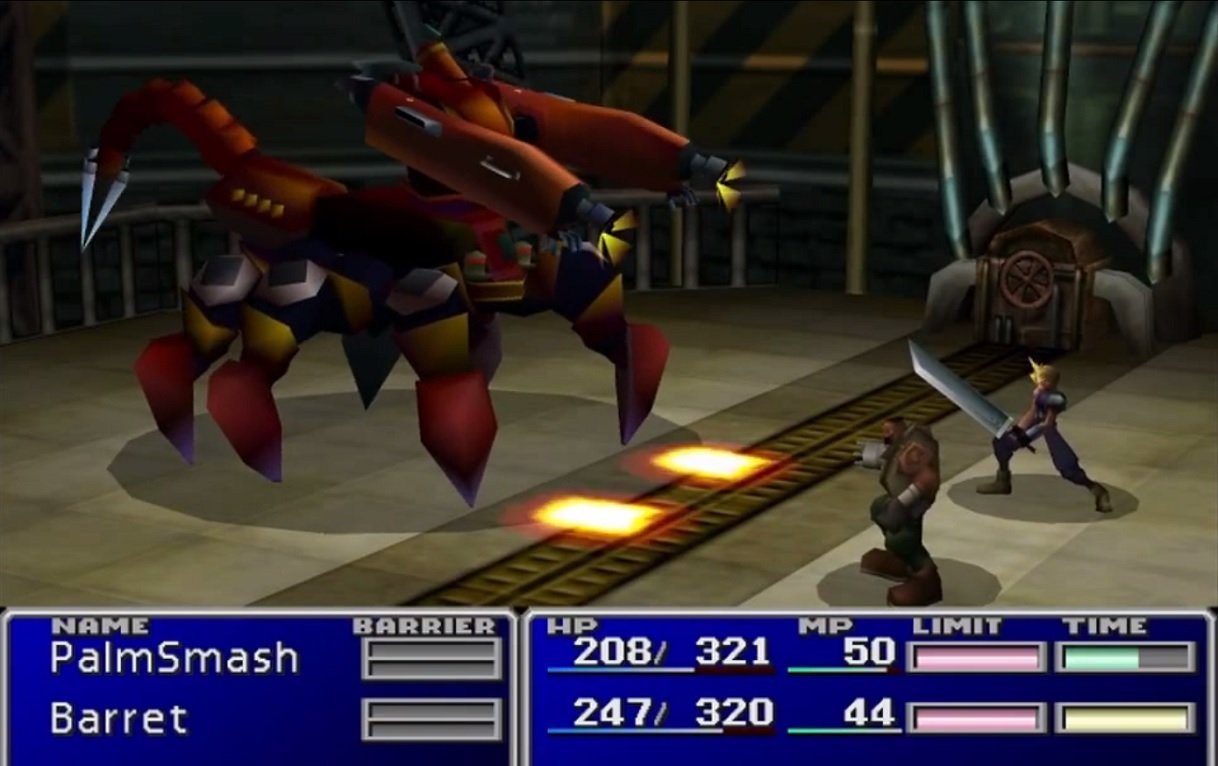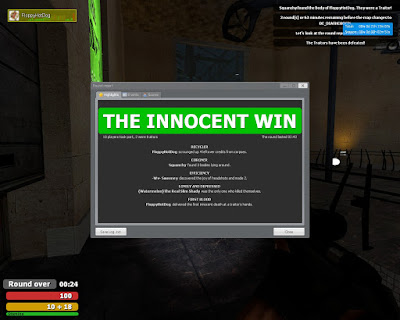If you're reading this on mobile, turn your device sideways for correct image notation.
This review is an unpublished post for an Android app review site I used to work for.
Good lord, I feel a meteor bearing down upon me. This is the big one, THE big one. Ask any gaggle of gaming adults what the best game of all time is, and the curious consensus is huddled around two titles that came out around the same time: Ocarina of Time, and the behemoth that is Final Fantasy VII.
I can only brace for the incoming tomatoes so long because, honestly, I never liked the game, so at the very least you can consider yourselves lucky that I picked up this review, because you're about to read one of the only negative opinions of this game in press history. Negative not because of what the game is, so much as the impact it had on the industry.
Let's start from the beginning. Prior to FF7's 1997 release, it was an awkward time for Square, a seminal RPG developer best known for their Final Fantasy series, as well as glut of -and this is an important detail- Nintendo-exclusive RPGs. Subsequent to Nintendo's ludicrous and bone-headed decision to make the Nintendo 64 cartridge-based (despite said console being the company's first true leap into complicated and memory-heavy 3D games) many devs strolling on the deck of the RMS Super Famicom were spotting a big ol' iceberg cresting the horizon. As soon as developers took note of the sexy 750 megabyte CD storage space of the PS1 discs, compared to the pitiful 64 megabytes of N64 cartridges, they were rats from a fleeing ship.
This is all important because the relocation of Square from family-friendly Nintendo-land to the brooding, edgier, and older audience of the Playstation was definitely a determining factor in why this game made such a sharp turn aesthetically and thematically from the previous 6 games. FF7 is dark and pessimistic, laden with angst and halfway divorced from the traditional fantasy of its Dragon-Quest-inspired precursors. Lost in that transition is a lot of heart. Characters are either melodramatic and cynical, or neutral and detached from any relatable personality. As a result, you end up with vaguely-motivated stereotypes towing your story, rather than believable, emotionally cogent people. Much of this is likely due to the slip-shod translation by SCEA, but it doesn't change the fact that the pacing of character development in this much-lauded story is too fast and loose, considering just how many roles there are to play in this epic. Within 4 hours of game time I already had 5 characters with me, and the prior hills of dialogue did almost nothing to give any reason to care about my team.
At times, however, the plot instead dwells on important bits for too long. If you don't know anything about a game's (one-note) antagonist, despite being six hours in, that's a serious writing problem, one that even shoehorned over-exposition can't act as a band-aid against. Sure, some of the cast gets developed later, but 6 hours is a long, long time to stay in the dark about what should be a high priority in a story-driven game.
Then there's the issue of dropped plot points... At the start of the game, you're working for a terrorist group called AVALANCHE, trying to sabotage the electric company Shinra, who are not only staffed entirely by Snidely-Whiplash wannabes, but are more importantly trying to siphon "Mako Energy" from the planet, killing it in the process. You blow up Shinra's reactors and accidentally kill people in the process, but it's explained away as being for the greater good. Then, Shinra destroys your part of the city to destroy AVALANCHE, causing unknown death tolls in the process, and failing to kill you regardless, because they made their plan obvious to your group. There is an enormous amount of time spent to establishing this premise, and the connections between the events of the game and the real-world foreign-policy of western countries trying to curb terrorism are right there in your face, but no commentary is made on that comparison. It's merely shown, as if to say: "Ha! See? Symbolism!" Why yes, it is symbolic, but if there is no statement made on the symbolism, then all that's been done is waste time that could be spent rounding out characters instead. There could have been a really thought-provoking narrative here, but the game is too hesitant in locking onto said narrative to really wow us with anything resembling a step forward from the usual gaminess of "BAD GUY BAD. YOU GOOD. MUST DEFEAT BAD GUY."
Granted, there are things the story does exceptionally well. The world-building is fantastic. Detail oozes out of every corner, developing the setting with a vividness almost unmatched for the PS1, and making each new screen a treat to visually pry open. NPCs dance and waver around, interact with the world in believable ways, and give cute and succinct insight into why they exist, as well as what their life is like.
And, this should go without saying, being a Final Fantasy game and all, but the art direction and music are simply without comparison. The pre-rendered backgrounds, though they have aged terribly, are miles ahead of the competition at the time, and the music breathes life into every environment, setting the mood perfectly for any smoothly-integrated cutscene or lush, pulsing vista.
You can make the best world in gaming history, however, and it will still become tedious if the narrative and gameplay are sub-par. I've already explained the failings of the latter, but what I neglected to mention was how this game trips itself up so thoroughly in telling a story through gameplay...
FF7 uses a "Materia" system to drive most of the RPG elements. Basically, Materia are little gems you find on the ground and in shops that you can attach (I guess via duct-tape?) to your weapons, allowing you to gain certain abilities and spells. Now, this immediately is a good concept, because it creates a tangible connection between the focus of the story and how you play the game (even though it's a bit silly sometimes, e.g. why do I need Materia to know how to "Steal" something?). Materia often comes with tradeoffs, though, such as a steep price, being locked behind one of the game's many tedious trial-and-error puzzles, or lowered stats. The Fire Materia will make your magic defense stronger but your physical defense weaker, or something to that effect. The issue is that there is barely any meaningful difference between character stats before the Materia is equipped, meaning that each character is essentially a blank slate gameplay-wise.
Now, this allows for full customization, sure, but the primary focus in an RPG, a Role-Playing Game, is the playing of a role, and if each character's role can be changed on a dime, then there are no consequences in the party choices you make, and no immersion in the unique capabilities of characters. They become inconsistent characters. You'd think that a team consisting of a ninja, a talking mutant dog, and a gun-slinging vampire would be quite the diverse posse, with each member possessing novel abilities that have varying impacts on different opponents, but really, they all feel the same.

Materia creates a separation from the story as well. Battles may as well take place in another universe, because how characters act and function in cutscenes or in story dialogue is constantly contradicted by your Materia choices, and the aforementioned androgyny of your abilities. For example, take Barret: He's a loose-cannon. A hulking, angry lunk of a guy. He's got a warm heart and good intentions, but he often takes a sledgehammer approach to things, shooting before asking questions, rushing in head first and never backing down to physical confrontation. He favors might over mind, and anything that makes him have to think or wait just irritates him... Yet, give him ONE Materia, and he's now your healer. Let me repeat that: the man with a cybernetic cannon strapped to his arm, who's shoes are almost as big as the protagonist's body mass, is now your medical super-wizard. It's almost laughable how much the components of the game contradict each other.
Some may see me as simply contrarian, but it's honestly none of my business if people enjoy a game. It is my problem, however, when a mediocre game becomes financially successful, because then every game subsequent will try to borrow it's flawed mechanics or presentation to gleam more money from a similar audience. Razorfist, the internet's Dennis Miller, put the shift in themes encompassed by FF7 this way: "Here's a question: If so many people's introduction to the entire RPG genre was this leather-belt-buckle-and-zipper drenched compensatory sword-wielding emo laughing stock, what do you suppose these people would then expect from the RPG genre as a whole from that point forward? Well, they sure got it." Even looking at later entries in the series, the poisonous impact of this game's legacy is clear, which makes FF7 look worse in retrospect, even though FF7 is just slightly above average in its own right.
As an Android port, it's as shoddy as you'd expect from Square Enix, given their previous failures to implement emulators even half as decent as the ones homebrew programmers churn out in their sleep. It doesn't even work on my phone for whatever reason, so I had to use somebody else's. For some users on the Play Store, it's crawling with crashes and graphical issues. Clearly there wasn't a lot of thought or QA put into it, but it's still playable if you're lucky, and if it just doesn't work at all for you, a refund option is available: the first I've ever seen for a mobile game...
But, despite all this, despite the broken targeting system, despite the slow turn-based battles hobbled by un-skippable attack animations, there is a game with genuine charm here. It's not worth the price, but if you're just dying to know what a standard RPG was like from the late 90s, or if you just want to see what all the hubbub is about, it's at least worth a glance. Just don't put too much stock in the fond yet muddled childhood memories of PS1 owners.





















